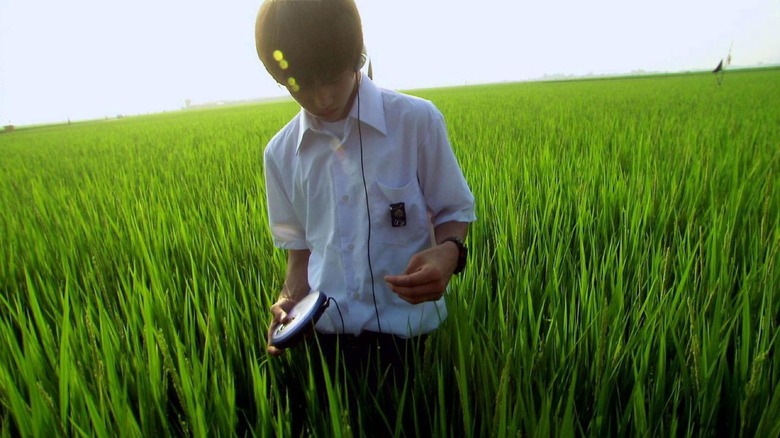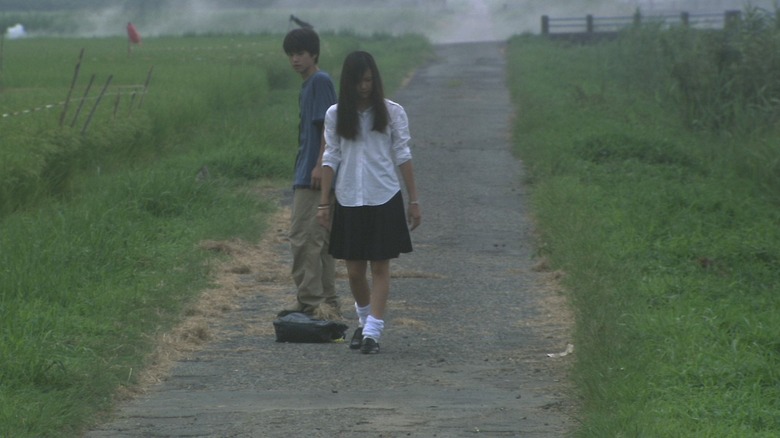The Daily Stream: The Dark Teenage Dream Of All About Lily Chou-Chou
(Welcome to The Daily Stream, an ongoing series in which the /Film team shares what they've been watching, why it's worth checking out, and where you can stream it.)
The Movie: "All About Lily Chou-Chou"
Where You Can Stream It: Pluto TV, Tubi, Vudu
The Pitch: Yūichi Hasumi (Hayato Ichihara) is an introverted 14-year-old boy who idolizes Lily Chou-Chou, a Björk-like singer whose lush, surreal music provides the perfect escape for his hellish life. Yūichi is an unwilling member of a gang run by his classmate and former friend Shūsuke Hoshino (Shugo Oshinari), a formerly mild-mannered, high-scoring student who, after a near-death experience while on a group vacation in Okinawa, transforms into a cruel, manipulative bully.
After Shūsuke's sudden shift in personality, Yūichi is forced to do his now-tormentor's bidding, including shoplifting, sexual humiliation, blackmailing their classmate Shiori (Yū Aoi) into prostitution, and other awful actions. The only thing that saves Yūichi from the brink is running the Lily Chou-Chou fansite, where he has daily anonymous interactions with other fans of the singer, some of whom he may know in real life...
Why it's essential viewing
Something happened in Japanese cinema in 2001. That year saw a surge in movies about the loneliness of the digital age, like how the J-horror movie "Pulse" captured the lonely horrors of the world wide web. But few films better embody the emptiness of the world wide web than Shunji Iwai's "All About Lily Chou-Chou," an enigmatic coming-of-age film that resides in a world where innocence seems to have never existed. It's a dark, vicious, lonely little movie that paints a cynical view of teenhood and fandom. And yet, something about "All About Lily Chou-Chou" burned in my brain when I watched it many years ago when I myself was a teen. "This movie gets me," I thought, "even if I don't totally get it."
"All About Lily Chou-Chou" posits that there are few things tying us together in the world — not emotional connection, not friendship, not family — except for a shared, almost overzealous love of a thing or a person. In this case, the fictional chanteuse Lily Chou-Chou (whose singing voice is provided by real Japanese musical artist Salyu), whose entire appeal is that her real face has never been seen. And in a way, it was painfully prescient. There's nothing more unifying or terrifyingly isolating like the internet, which provides the ominous connective tissue for "All About Lily Chou-Chou." Throughout the film's hefty 2 hour 20 minute runtime, flashes of the message board take over the screen, as the fan site's users gush over their idol and the "ether" through which she communicates — Lily Chou-Chou's term for the transcendent place from which her music is born, and where she seeks to bring her fans — and speak of the emptiness of life in increasingly nihilistic terms. "The world has already ended," a user known as Blue Cat writes.
The totality with which the users speak and the apathy through which they view the world feels fitting for the angst of the teenage experience (where everything seems like the end of the world) but can barely match up with the dark realities of Yūichi's life. Because of this, the internet — which at this point in time, was treated with so much paranoia — becomes a kind of balm and lifeline for of Yūichi, even as it isolates him further. That messy, unclear divide between the art that saves you and the obsessions that hurt you becomes even more blurred in "All About Lily Chou-Chou," a film that at the time of its release was criticized for its frustrating ambiguity. Still, I think about the tender moments that are scattered throughout this relentless movie which speak to that connection that art and technology can sometimes make, like when Yūichi gives a distraught Shiori his earbud and they listen to Lily Chou-Chou's music together while on the train home. Silently, Shiori dips her head and rests it on Yūichi's shoulder, the two of them bonded in their unhappiness and in the temporary relief of this transcendent music.
"Maybe I'm writing here because I wanna shout, 'I'm here!'" a user writes on the Lily Chou-Chou fansite. At times, the film feels like a shout into the void, but it's a shout nonetheless.
After Lily Chou-Chou
I revisited "All About Lily Chou-Chou" after having seen "After Yang," the contemplative new sci-fi film by Kogonada that contains a few surprising nods to the 2001 Shunji Iwai film. First, the song that plays prominently throughout the film is a cover of the Lily Chou-Chou song "Glide," sung by Mitski. A few of the characters wear a Lily Chou-Chou T-shirt too, both of these items given real emotional weight even in the brief glimpses we get of them.
"All About 'Lily Chou-Chou' was one of those films that has never let go of me while I'm writing my own stories," Kogonada told Reverse Shot. "There are reasons certain films resonate, because they resonate with your own struggles, in trying to understand your own relationships and space and time and meaning and all of those things people struggle with. At least, maybe it's that way for a certain type of person, who has existential angst or feels like they are displaced or dislocated somehow. These things become a part of their everyday thoughts."
But these little nods seemed like more than just an homage to a movie that Kogonada loved, or items that the filmmaker used to convey how simple tokens can act as emotional anchors in a person's life — how a T-shirt can unlock a whole life, or how a single verse of a song can mean a whole confession of love. Strangely, there's a shared dreamy DNA between "All About Lily Chou-Chou" and "After Yang," different as the films may be — "Lily Chou-Chou" in all its dark and violent teenage angst, and "After Yang" in its melancholic ode to life. It's in how they both treat technology, or rather, how they're two sides of the same coin. I like to think of "After Yang" as kind of a benevolent "Black Mirror," an optimistic view of how technology can bring humanity closer together — the subjectivity of an android rendered more than human thanks to the weight of living. And in the case of "Lily Chou-Chou," the foggy, blue-toned loneliness and the connectiveness of the early aughts internet. It's fascinating to me that "All About Lily Chou-Chou," a film that I'm not even sure was itself was aware of what it was doing, can still burn in my mind so many years later, transformed so far from its original form.


